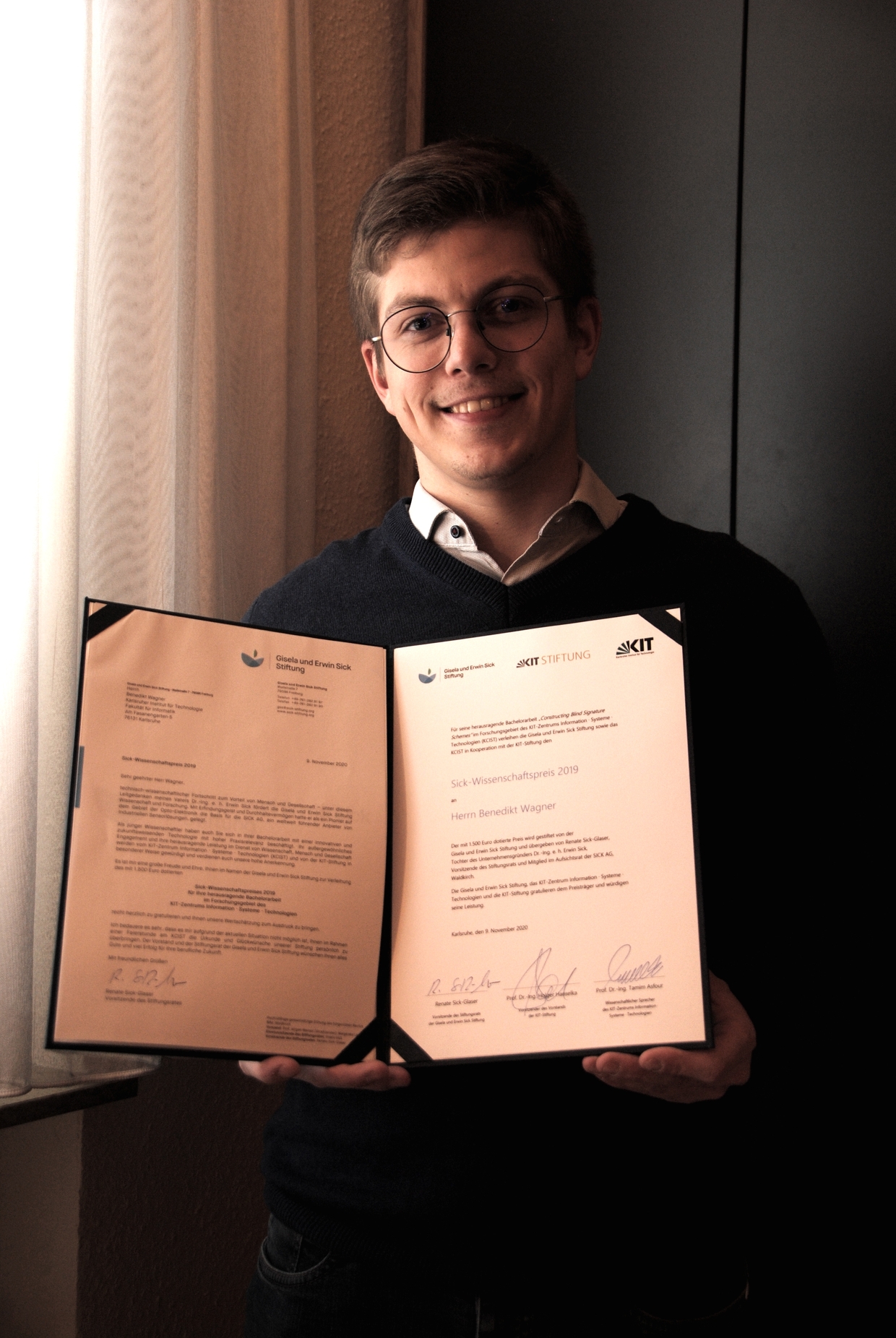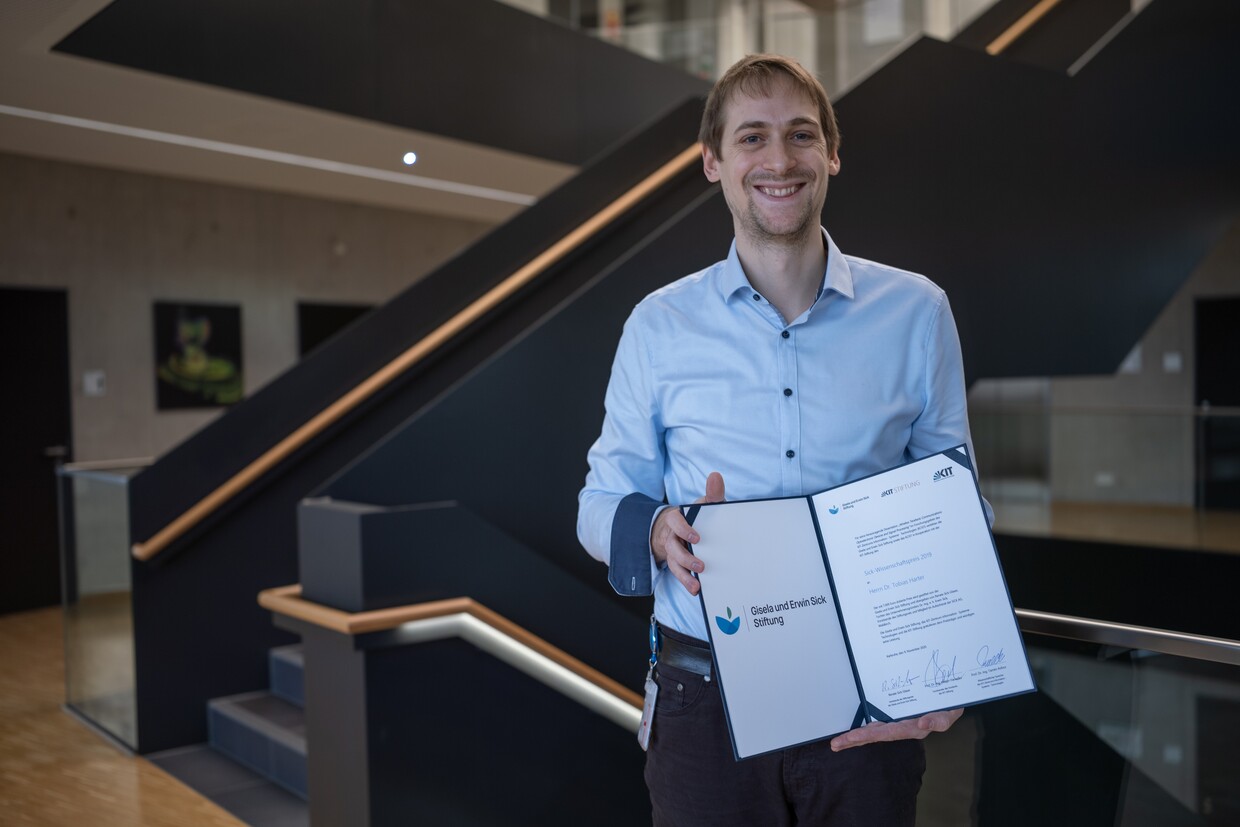The Science Award of the Gisela and Erwin Sick Foundation, honours both fundamental and application-oriented research in the KCIST research area. The prize for the best dissertation is endowed with € 7,000, the best bachelor or master thesis with € 3,000. Both prizes are awarded yearly by KCIST in cooperation with the KIT-Stiftung.
We are proud to announce this year's winners. This time two winners shared the prize for the best final thesis in 2019:
| Best Dissertation 2019 | Dr. Tobias Harter | „Wireless Terahertz Communications: Optoelectronic Devices and Signal Processing“ |
| Best Thesis 2019 | Tobias Röddiger | „Exploring the Wearability and Design of a Fully-Integrated Sleep Tracker“ |
| Best Thesis 2019 | Benedikt Wagner | „Constructing Blind Signature Schemes“ |
Congratulations to the winners, and many thanks to all others for their participation.
About the winners and their theses
Dr. Tobias Harter, Dissertation „Wireless Terahertz Communications: Optoelectronic Devices and Signal Processing“, Fakultät für Elektrotechnik und Informationstechnik, Advisor: Prof. Christian Koos, Institute of Photonics and Quantum Electronics.
Short abstract:
Nowadays, wireless networks are operated in the lower gigahertz range and are therefore limited in their bandwidth. Data transmission at carrier frequencies in Teraherzt (THz) range between 0.1 THz and 1 THz (T-waves) has the potential to overcome the current limitations of wireless networks. The work addresses various approaches to enhance the performance of T-wave systems. It discusses novel signal processing concepts, investigates novel optoelectronic devices for T-wave transmitters and receivers and validates the viability of the proposed systems by data transmission experiments. These have shown that the developed approaches significantly increase the performance of wireless networks and can also be transferred to other areas of application, such as THz spectroscopy.
Tobias Röddiger, Masters Thesis „Exploring the Wearability and Design of a Fully-Integrated Sleep Tracker“, Fakultät für Informatik, Advisor: Prof. Michael Beigl, Institut für Telematik - Pervasive Computing Systems.
Short abstract:
With an ever-growing geriatric population and modern lifestyles, the increasing prevalence of sleep disorders poses a serious threat to our society. However, specialized sleeping labs currently fail to diagnose and treat the full spectrum of sleep diseases broadly. The aim of this work was to investigate the portability and design of a fully integrated sleep tracker to provide a detailed and comfortable analysis for a variety of sleep problems allow at home. The proposed solution enables most of the sensors used in sleep laboratories to be integrated into a single device. In addition, through the completion of this solution and the addition of the previous diagnostic procedure, sleep experts will gain further insights into the patient's sleep.
Benedikt Wagner, Bachelor Thesis „Constructing Blind Signature Schemes“, Fakultät für Informatik, Advisor: Prof. Dennis Hofheinz, bis 2020 am Institut für Theoretische Informatik - Kryptographie und Sicherheit
Short abstract:
Blind signatures are interactive protocols that allow a signer to sign a message of a user without learning anything about it. They are therefore useful privacy-preserving tools in many digital systems such as E-Cash, E-Voting, and anonymous credential systems. An important feature of blind signatures is that they have to be tightly secure, i.e. their security guarantee should not degrade when the system scale increases (for instance with the number of users). Previous constructions of blind signatures either loose tightness or are based on non-standard assumptions. The main contribution of this thesis to the state-of-the-art is a novel construction of a tightly secure blind signature scheme from standard assumptions.
Gisela and Erwin Sick Foundation
The Gisela and Erwin Sick Foundation was founded in 2002 by Gisela Sick, the widow of Dr.-Ing. e. H. Erwin Sick, the founder of SICK AG. The range of funding offered by the Freiburg-based foundation encompasses the areas of youth and upbringing, education, vocational training, and science and research. In recognition of the life's work of her deceased husband, an inventor and pioneer in the field of opto-electronics, Gisela Sick places a special focus on natural sciences and technology in her foundation activities with the aim of making a contribution to securing Germany as a location for technology and future research.
To promote young talent in the MINT science fields, the foundation awards sponsorship prizes at the technical universities in Hamburg, Dresden and Karlsruhe, at the universities of Offenburg, Furtwangen and Konstanz as well as at the dual universities in Villingen-Schwenningen and Lörrach. The Foundation also awards Germany Scholarships.




